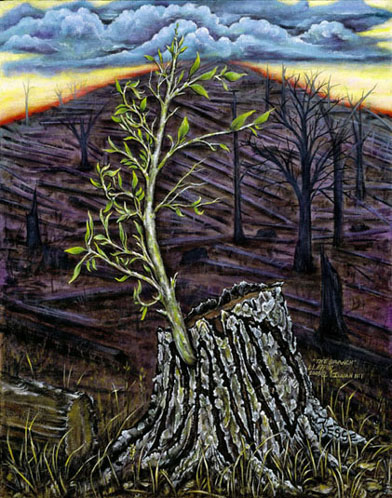 November 20, 2022: May God’s words be spoken, may God’s words be heard. Amen.
November 20, 2022: May God’s words be spoken, may God’s words be heard. Amen.
For some, this is a day called Christ the King Sunday, but the truth is, that is not a title he would have ever claimed. As we heard in the Gospel, it was a title given to him by the oppressors who crucified him. No, Jesus would not be happy with this King business I believe, Jesus as Lord is enough, and was for centuries for his followers, as Christ the King wasn’t even a thing until 1925. So, not Christ the King…but it is Advent.
Last week, I talked a bit about the original seven week Advent, which we celebrate here. Advent is a time when we remember the darkness in which we walk, and the light that is to come. If you were in doubt about whether Advent, from a lectionary point of view, is seven weeks long, just look again at our reading today from Jeremiah and the Canticle – or for Latin nerds, the Benedictus. Jeremiah begins with a stern warning from God for those in power that because they have abused their people, because they have not cared for their flock, they will meet with God’s wrath. Jeremiah had been speaking about the failure of leaders in the time of the fall of Jerusalem to the Babylonians in 587 bce. And the passage ends with a very Advent-y verse “The days are surely coming, says the Lord, when I will raise up for David a righteous Branch…”
God was not happy with shepherds who fail their sheep. If that sounds a lot like Jesus who railed against those in power, you are right. One of the things that our faith, our scriptures, make abundantly clear, is that if you are going to be a leader, a shepherd of a people, than your focus must be on them, not on your own desires. And that is not easy – quite the opposite. “Taking care of sheep is a muddy, messy, smelly ministry…
I think I shared this story years ago, but if so, I want to share it with you again today. Many years ago an [Episcopal] priest was leading a tour of the Holy Land. He and his parishioners were bouncing along a lonely dirt road when their Palestinian driver slowed to a stop. A flock of sheep was blocking the road. Behind the sheep a man stood yelling and beating them with something akin to a leather whip. He was trying to make them move on ahead. Dismayed, the priest commented to the driver, “This is contrary to everything I have ever read in the Bible about a shepherd. I thought a shepherd was supposed to lead and the sheep would follow.” The …driver smiled and said, “He’s not a shepherd. He’s the butcher!”[1]
The man in the story definitely did NOT have the sheep’s best interest at heart. Being a shepherd is about never forgetting that the focus of your work must always be on the welfare of the sheep. Being a leader of a people is about never forgetting that the focus of your work must always be on the welfare of the people you lead. This is true, not only for those in government, but for all kinds of leadership positions – from President to parent, from CEOs to church leaders. Where we get lost as leaders is when we begin to believe that the world revolves around us.
So this passage teaches us a bit about what good leadership, being a good shepherd, looks like. Jeremiah makes it clear that in the eyes of God shepherding requires people willing to do the hard work. Now, we don’t have to have lived in the Ancient Near East to understand what can happen when leaders fail those they lead – when they fail the shepherd test of service. We have borne witness to failed leadership in our lifetimes, and the way in which it can cause pain, fear, and division of a people. Today, we can certainly understand what it must have felt like to be a people divided, scattered, fearful of our leaders, and not sure what tomorrow will bring.
We could feel like all we want to do is pull the covers over our heads and pray that things will change. That perhaps new leaders who understand what it means to be a shepherd will emerge and make everything better in some distant future. But, if we focus only on the current predicament, and the hope of new leadership, we miss what God intends for us, and it is something so very needed now.
Looking further in the passage from Jeremiah, after condemning the current leaders, God then says “I myself will gather the remnant of my flock, and…I will raise up shepherds over them who will shepherd them, and they shall not fear any longer, or be dismayed, nor shall any be missing.” Now, ignoring the strange twist from the shepherds having dispersed the flock, to God doing that (a sermon for another day), the verses tell us what God plans for the people who are divided and abused sheep, and it has nothing to do with pulling the wool over your own eyes and going back to bed in a hope to wake up at a time when the nightmare will have ended.
God declares “I will raise up shepherds…” Guess where God gets those new shepherds? From right within the flock! God intends to work through those who once were led, to lead, and to care for the people – to be shepherds themselves.
Now one can only imagine that going from sheep to shepherd requires something of the sheep involved, right? Yes. Being a shepherd begins first with listening to God, and then following God’s call. It is about being a prophetic voice of light in the darkness. You see, there is a bit of the prophet in all shepherds, and a bit of the shepherd in all prophets. Now, speaking of prophets…
In the Canticle, Zechariah is proclaiming the joy of the birth of his son, one who will prepare the way for the people to receive the One who is to come. John, his son, will “…shine on those who dwell in darkness and the shadow of death, and to guide [their] feet into the way of peace.” That’s the work of prophets – to light the way for others. Jeremiah was not the first prophet, and John was not the last one.
Thankfully, we have had prophets throughout the centuries calling out against injustice, fighting oppression, and working for peace. In our somewhat recent past, we can name a number of them: Mahatma Gandhi, Dorothy Day, the Rev. Dr. Martin Luther King, Jr., Aung San Suu Kyi, Frederick Douglas, Sojourner Truth, Nelson Mandela, Shirin Ebadi, Harvey Milk, Elizabeth Cady Stanton, Archbishop (ret.) Desmond Tutu, Wangari Maathai, William Wilberforce, Susan B. Anthony, Malala Yousafzai, and so many more. These are the modern day prophets and shepherds that have shown the light to those wandering in darkness, either through their words, their actions, or just standing up for their right to be who they are.
But sometimes sheep can be led astray by false prophets and careless shepherds too. Last week, in the gospel, Jesus warned his followers: “Beware that you are not led astray; for many will come in my name and say, `I am he!’ Jeremiah too was railing against false leaders. And they are with us still.
They call for division of the people, for scattering some of them, and promising all of this will result in good things. These are fake leaders, false prophets, because they are not interested in the common good of all, but only a few, and most especially themselves. Many claim to be followers of Jesus too. In this country lately, there are the ones who claim this is a Christian nation. Christian nationalism, which is really white, homophobic, Christian nationalism, is the very thing Jesus warned us against.
“Beware!” Jesus says. Beware!
For when one advocates for this to be a Christian nation, they are making it clear that others are not welcome. Oh, perhaps it isn’t said overtly, but once this ethos sets in, Jews and Muslims (and anyone of any other faith) will soon become second-class citizens. For that matter, people of color and LGBTQ+ people will be as well, for Christian Nationalism is closely aligned with anti-immigrant, racist, and heterosexist ideologies. Openly, and covertly, all through history, we see this played out in things like the horrific attack on the Tree of Life Synagogue and the recent threats to Jews here in New Jersey, and of course – Nazi Germany and the holocaust. We see it in the burning of crosses (and the emblems worn on their robes) of the Ku Klux Klan. And sadly, even this morning, in another mass shooting at a gay bar – this time in Colorado. This is the result of false shepherds & prophets – the ones who claim that following Jesus means excluding, hating, and violence. Then they offer their thoughts and prayers.
The idea that many of these false prophets and shepherds call themselves Christian is not only ironic, it is unfathomable, because Jesus, the greatest shepherd of all, stood against everything they say and do. He cared for the lost, the lonely, the least, and the last – and he called us to do the same. The call of these leaders is a false one, and it has put the world on edge with fear of what is to come. Yet, the truth of our faith, the truth of Advent, is that we are not powerless in the face of darkness, not at all.
As shepherds and prophets, we have a lot of work to do, don’t we? Like John, we too are called to “To shine on those who dwell in darkness and the shadow of death, and to guide … [their] feet into the way of peace.” God is looking to raise up shepherds among us, and bidding us to listen to Her voice, because if we do not, if we choose to stay in the shadows, to not raise our prophetic voices, then we open the door for those false prophets and bad shepherds – and the sheep we are called to care for are lost. In the end, we are also lost.
So, what can we do?
Well, today, each of you will bring forward your pledge cards – a commitment to stewardship of this place, out of which we bring the gospel message of hope to a world in need, and in which we are given restoration for our souls as we do this prophetic work of being shepherds in the world. These pledges are a commitment to being good shepherds and prophets, but it is only one step of many, if we are ever to live fully into who God intends us to be.
In Advent most of all, we know that in the darkest of times, the light will always come. But it is up to each of us, following where the Holy Spirit leads, to be that light, Christ’s light shining in us, to the world.
To be the prophet of today, and proclaim from the highest hills, and the lowest valleys, that God loves everyone unconditionally and for all time.
To be the shepherd of a people who are lost, alone, or living in fear, that they may be restored, renewed, and open to hearing where God is calling them.
We are in Advent in the church and in the world. God is looking for prophets, for shepherds, to listen, to lead, and to love. Forget looking to someone else to fix whatever ails the world around you – look in the mirror instead – for the righteous branch God is raising up is you! And know deep within that with Christ, all things are possible, and you are capable of far more than you can ask or imagine!
I leave you once again with the words of the Rev. William Sloane Coffin. It speaks to our need to rise up and really see ourselves for who we are, and what we are called to do – to be good shepherds and true prophets in a time of darkness.
“May God give you the grace to never sell yourself short; grace to risk something big for something good; grace to remember that the world is too dangerous now for anything but truth, and too small for anything but love. Amen.”
For the audio, click below, or subscribe to our iTunes Sermon Podcast by clicking here (also available on Audible):
[1] Kari Myers. Homileticsonline.com
The Rev. Diana L. Wilcox
Christ Church in Bloomfield & Glen Ridge
November 20, 2022
Advent 3 (7 Week Advent) – Year C Texts
1st Reading – Jeremiah 23:1-6
Canticle 16
2nd Reading – Colossians 1:11-20
Gospel – Luke 23:33-43






